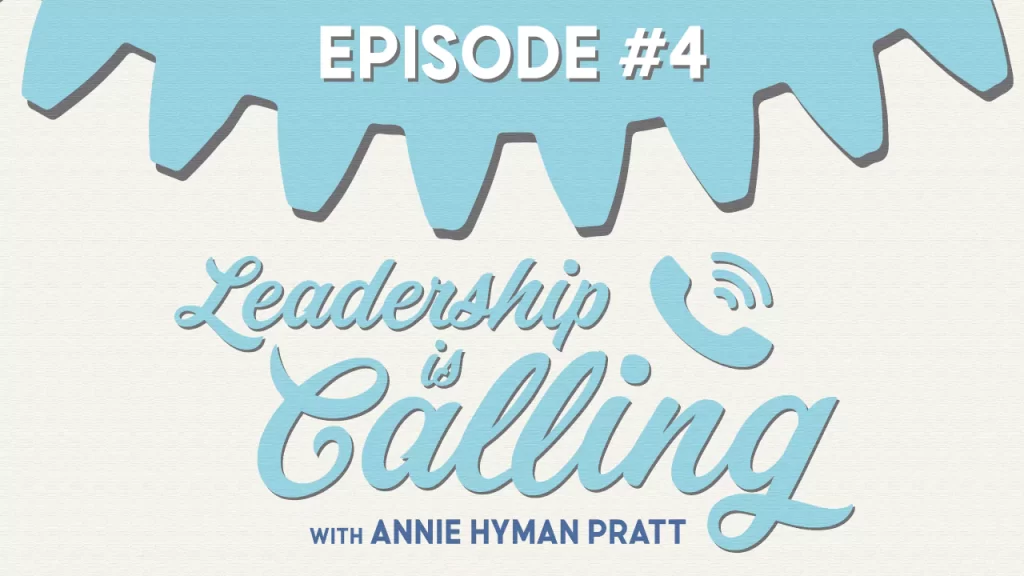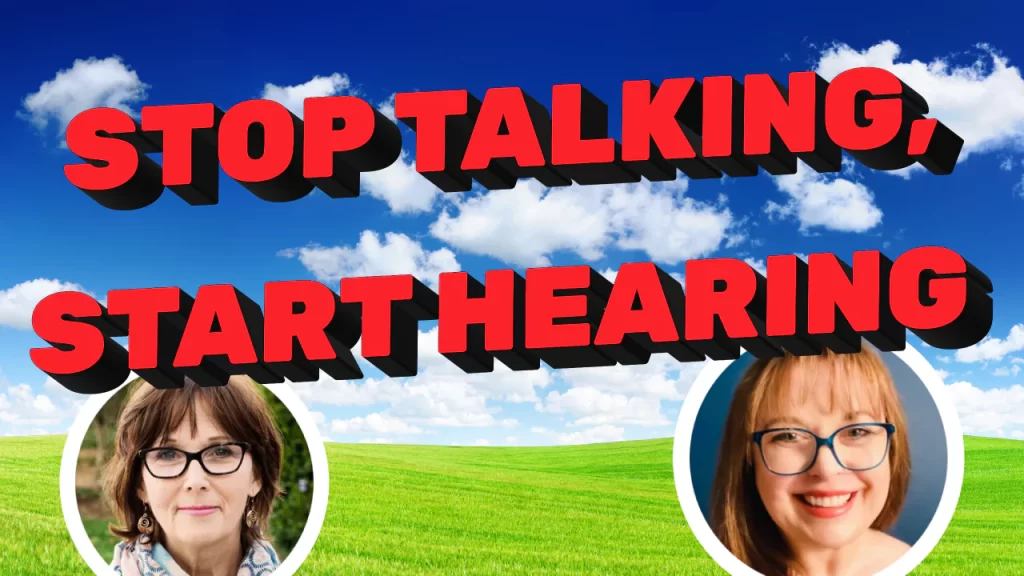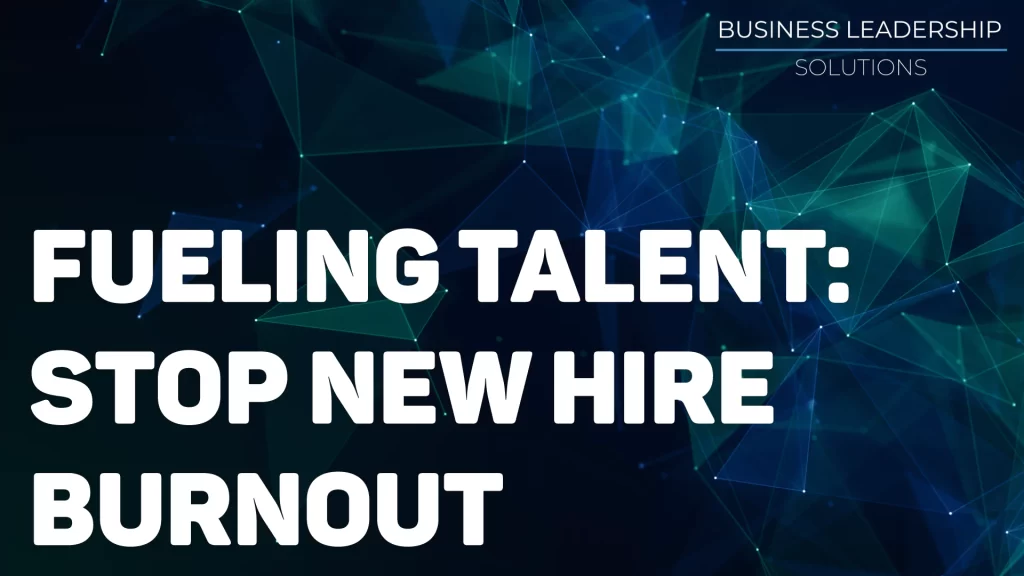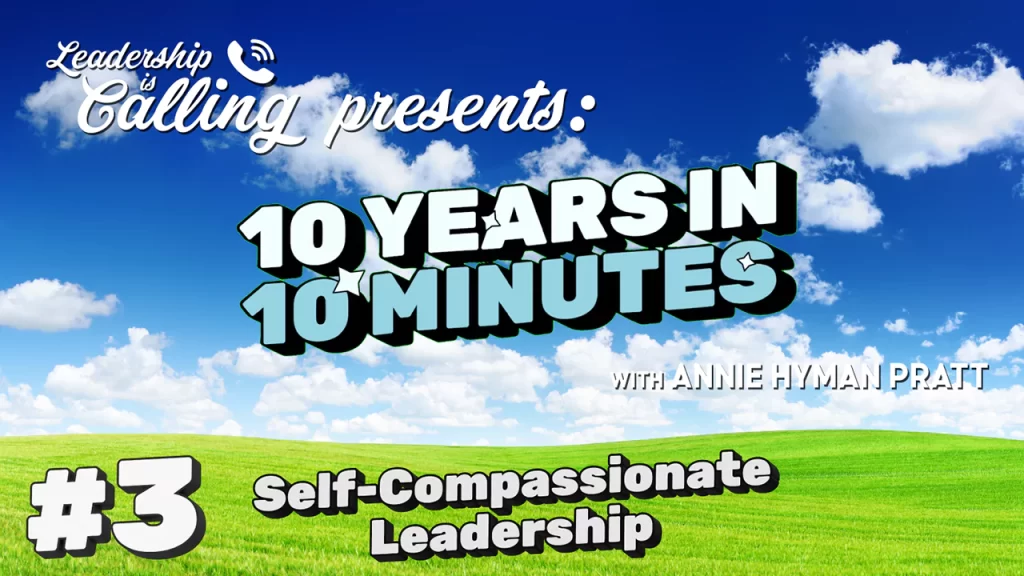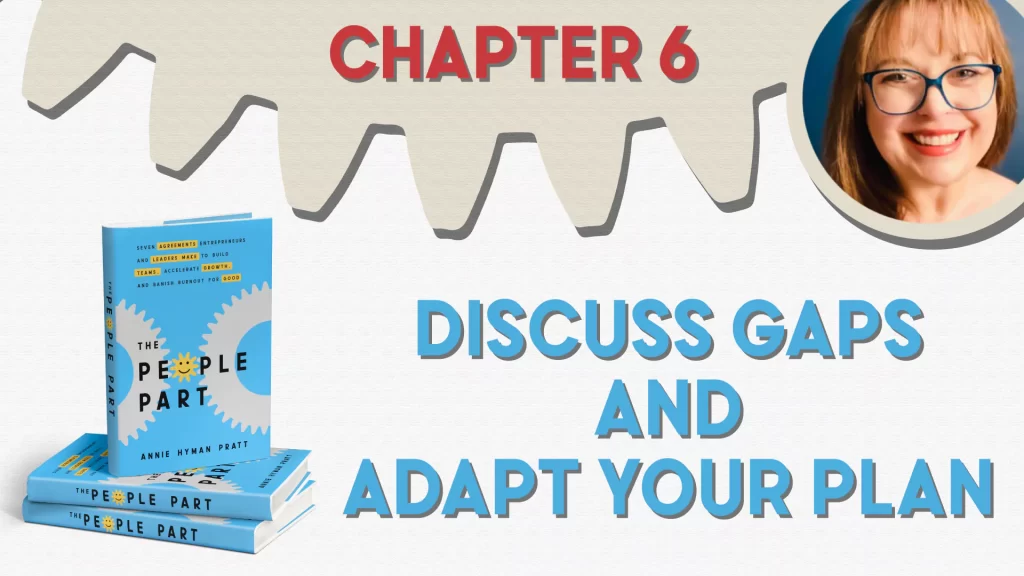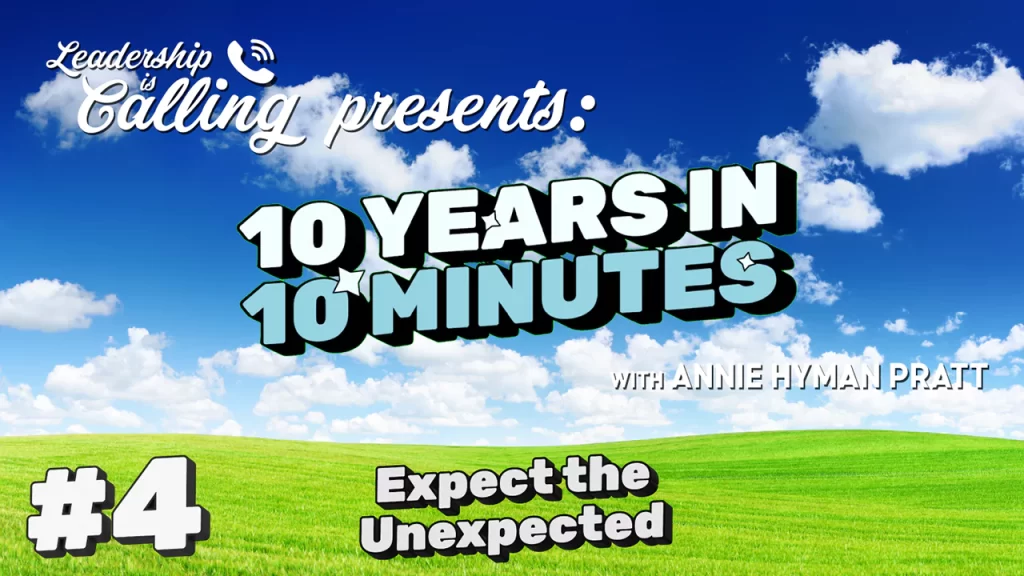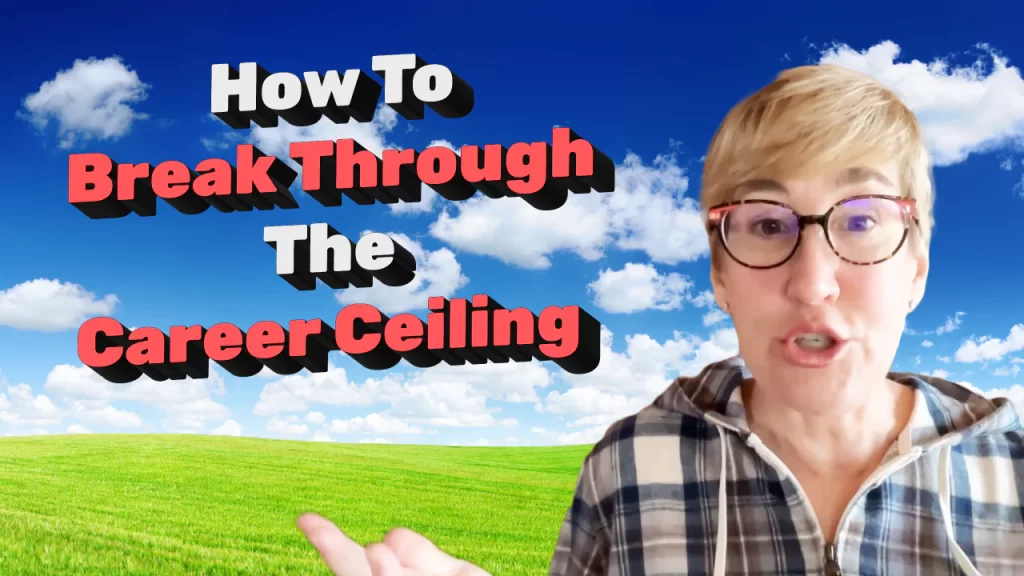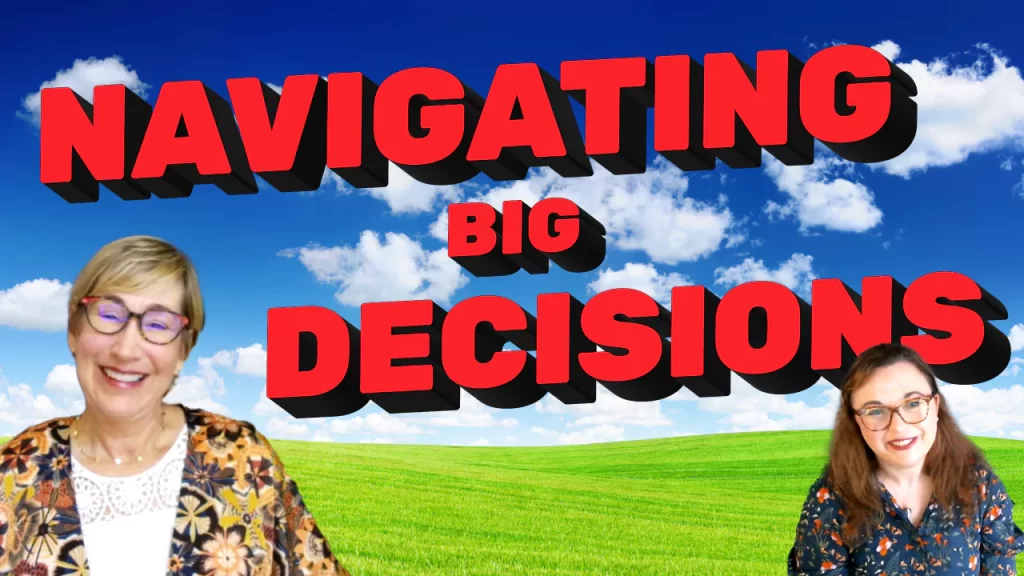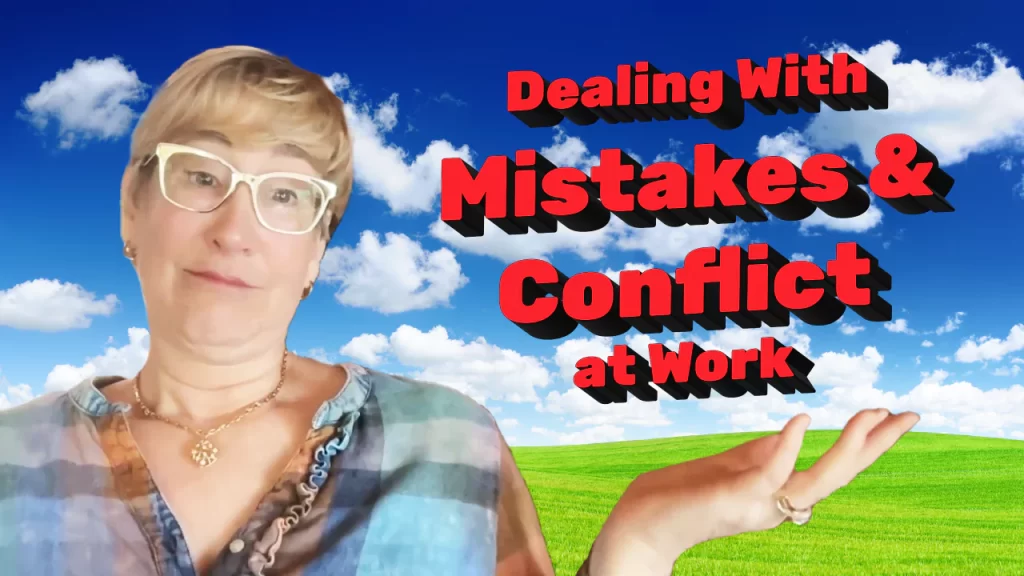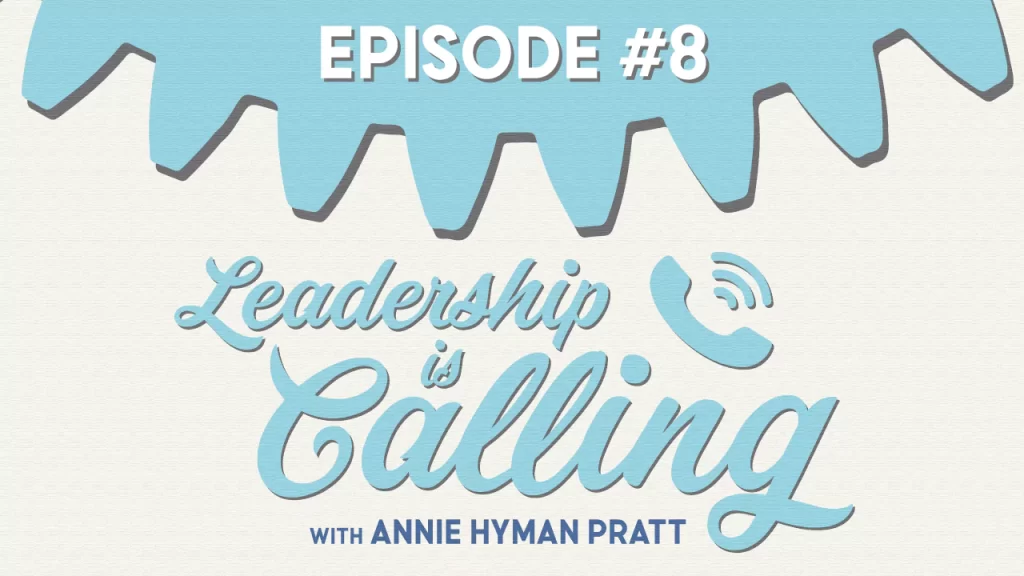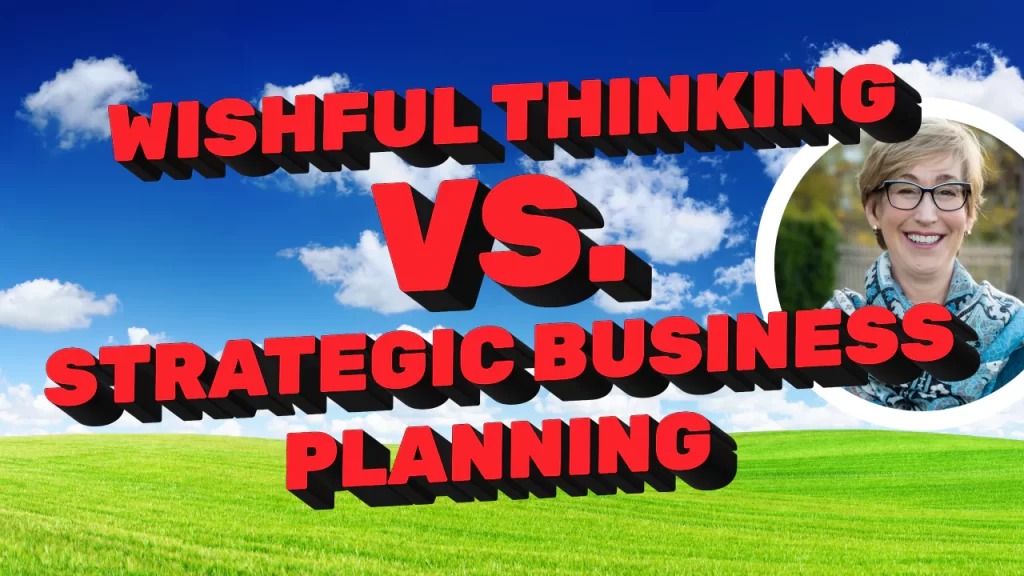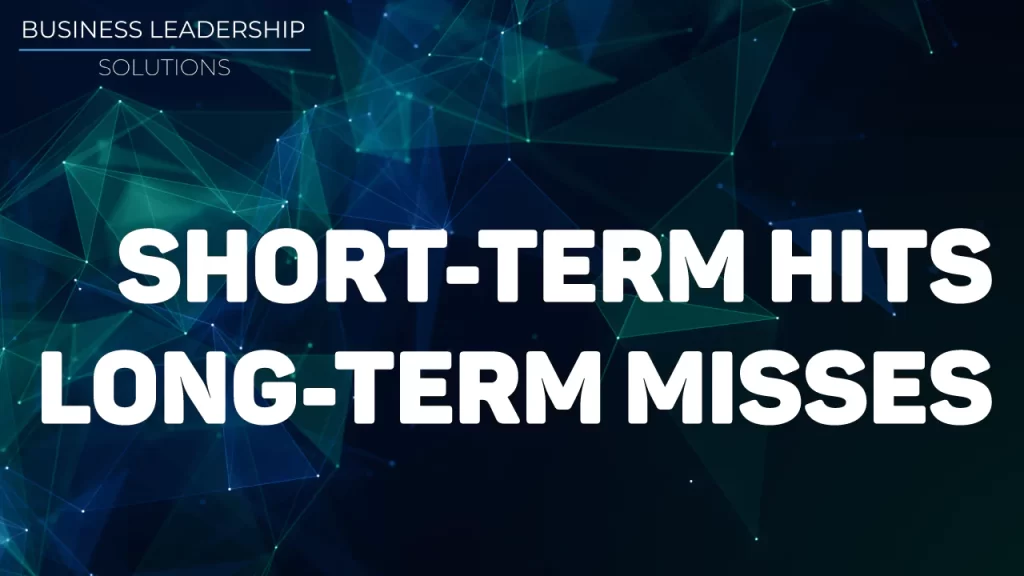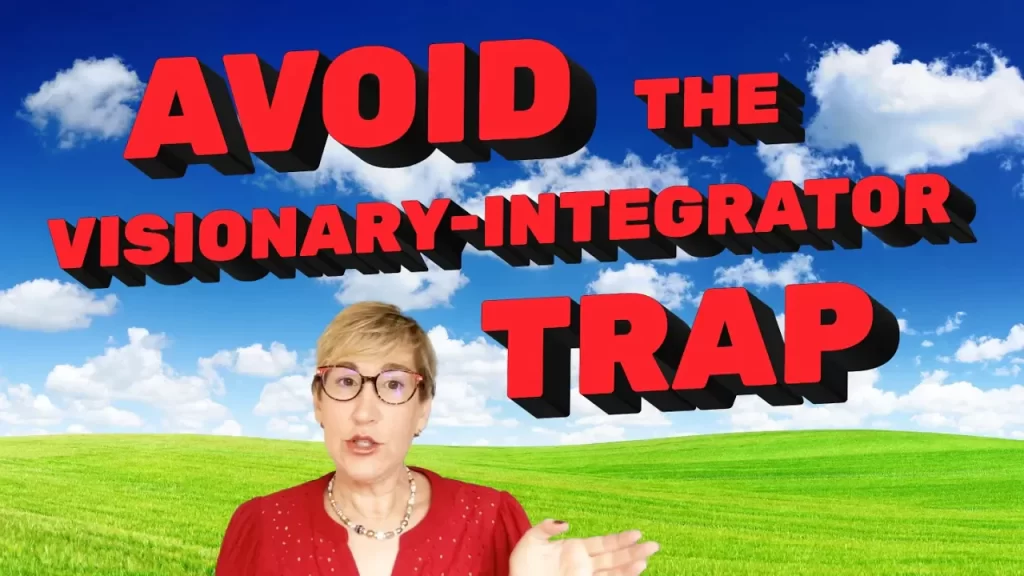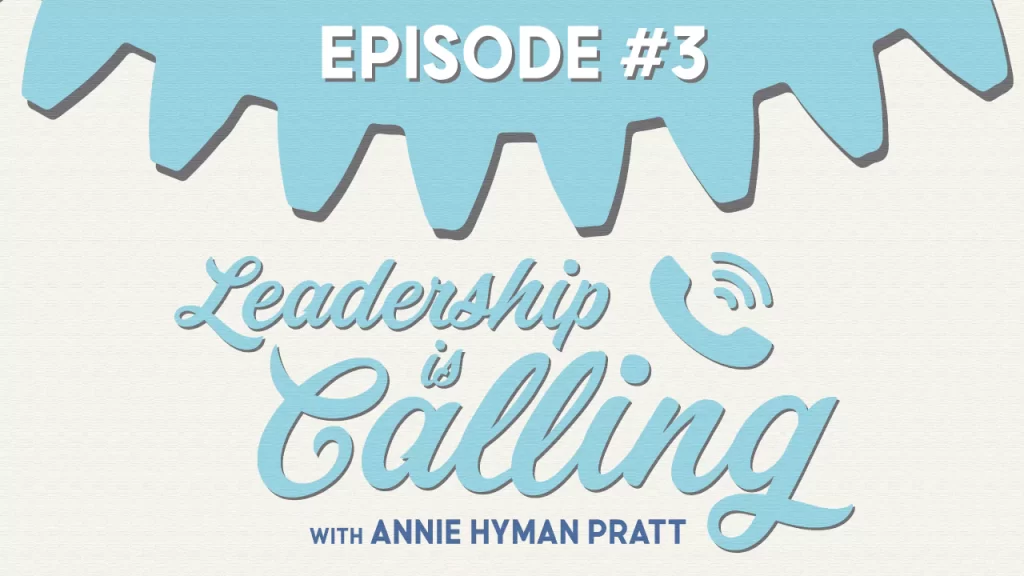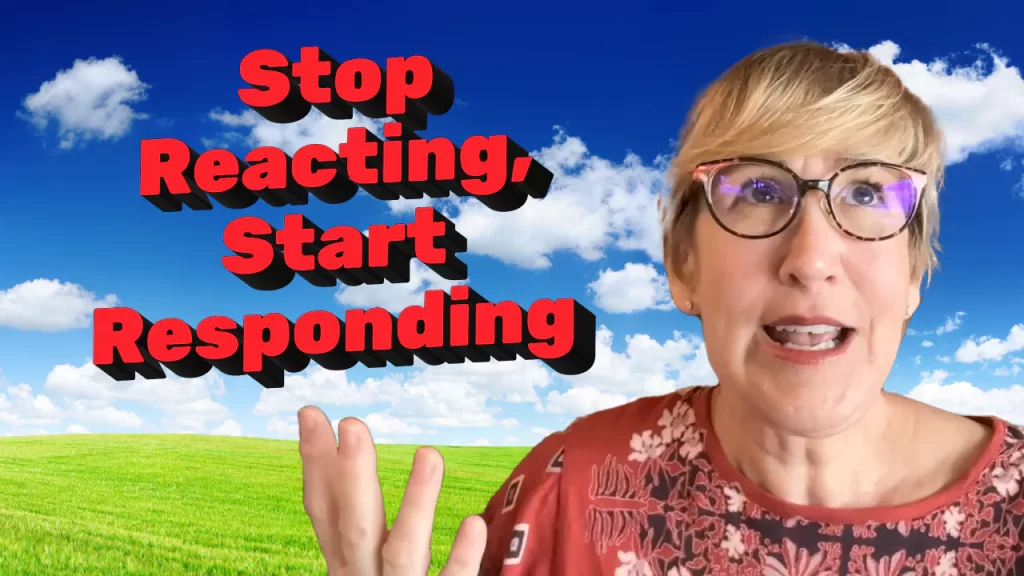Episode #31: How to Set Boundaries and Take Care of Yourself During Hard Conversations
Leadership is Calling Episode #31
Heather McGonigal & Régis Portovedo
- Description
- Transcript
How to Set Boundaries and Take Care of Yourself During Hard Conversations
As a leader, you will inevitably have to have hard conversations with your team members. These conversations can be difficult, but they are essential for building trust, resolving conflict, and driving performance.
In this video, Régis Portovedo, a successful COO, Event Strategist, and leader of high-performance digital business teams, shares her tips for having effective hard conversations. She covers topics such as how to prepare for a hard conversation, how to manage your emotions, and how to set boundaries. Régis also emphasizes the importance of self-care for leaders, and she shares some tips for taking care of yourself during and after hard conversations.
This video is for any leader who wants to learn how to have more effective and safe hard conversations. Whether you’re a new manager or a seasoned CEO, Régis’ tips will help you have the courage and confidence to have the conversations you need to have in order to be a successful leader.
I’m thrilled to introduce you to Régis Portovedo, a remarkable individual who embodies the art of achieving business success while nurturing a fulfilling personal life. Over the past few years, I’ve had the honor of working closely with Régis as her coach within our A+ Plus Leader Program. Régis, in her role as COO, faces the daily challenges of the entrepreneurial world, where she not only brings her CEO’s vision to life but also masterfully builds and guides her team towards achieving their strategic and revenue goals.
Can you relate to the constant juggle of a demanding work-life balance? In entrepreneurial ventures, where time is one of our most precious resources, the ability to resource oneself effectively becomes a paramount leadership skill. That’s why I believe you’ll find immense value in this podcast episode, where Régis generously shares her insights on prioritization and self-care.
Together, we pull back the curtain to reveal some lessons that she took from coaching and did the work to grow and implement into her leadership approach. Tune in and gain invaluable takeaways that can help you excel in both your personal and professional spheres.
Join us as we delve into the strategies and wisdom that have propelled Régis to success and discover how you can apply these principles to your ow journey, mastering the art of resourcefulness and leadership.
– Coach Heather
Régis Portovedo is an Event Strategist and Leader of High-Performance Digital Business Teams. With 6 years of experience in the market, she also serves as the COO of digital marketing expert Victor Damásio, where she has been leading a team of over 20 people since 2017. Régis is the driving force behind the entire business structure, which generates an annual revenue of approximately 20 million. In 2019, she took a step further and fully immersed herself in the live events strategy of major players in the digital market. Since then, more than 50 events have been conducted, generating over 20 million for its clients. In 2020, Régis decided to share her leadership knowledge and empower others. She has already transformed more than 50 students, who have developed themselves to become ‘A’ Players within digital businesses.
Key points:
- Hard conversations are a necessary part of leadership.
- It is important to prepare for hard conversations by thinking about the desired outcome and the other person’s perspective.
- Self-care is essential for leaders to be able to effectively handle hard conversations.
Related Resources:
A+ Leader Development Program and Mastermind
Downloadable Infographic: The Secret Recipe to Reverse Burnout and build Emotional Endurance for You and Your Team
Article: Self-Care Is Non-Negotiable | The Generosity of Leadership
More Information: Self-Leadership
Auto-Generated Transcript – unedited version
How to Set Boundaries and Take Care of Yourself During Hard Conversations
Regis: First, let me introduce myself. I’m Regis. I’ve worked with Victor Damásio for six years.
I started off as an entrepreneur who is a visionary, but not so much about managing. And this is what brings me here to ask for your help with that. And how much of the growth that I had during the years is because of APL, and I’m very glad to be here now after three years of the program. I have so many results in everything that I do.
Heather: You were talking about the part that we need to endure and how it would be to show how we need to be in this kind of position on leadership. And I think the learnings that I have is how to endure the difficult decisions so far for not so long. Now, I have to make decisions all the time. And some of them are not so great decisions, but it’s the best for the company. And to know that does not make us happier to do it and it still is too hard. And we have to take care of ourselves during that because I think the outcomes know the decisions that we have to make and make us go through them. And of course, knowing that there are consequences, that we also have to deal with the consequences of our hard choices. And to be okay with that, we couldn’t either. It’s a hard thing to do.
Regis: And as you always told me, nothing good comes from self-protection. We have to have an extra care not to get on self-protection because we are dealing with people and people think what they want about themselves and about the company. And we have to show them that, okay, we are trying to do that because the company it’s it’s something that that exists and demands some results and some goals and not to doubt ourselves that we are doing the best for them, even though they are not really thinking and looking at this way. So this is one of the greatest things that I have learned. This this he is he is with me. Yeah, I’m the CEO. And everything is going so quickly right now because I feel I have to manage the whole team and the whole business and have the best outcome for the people and also for the beauty. And it’s always a hard position for everyone who stays up there because as a company that is new, because 60 years, I think it’s a new business, it’s new to understand the complexity of all the roles and all the things that happens and all that process. And it’s a lot. We take a lot and we have the tools to make it happen, but not most of the time. I was going to say it’s not easy. Most of the time it’s not easy and we have to deal mostly with ourselves, with our emotions, and to see and to get through everything that is in between. So my role is part of that. And I think I accomplished well to do that. Now that I have this kind of support for. Yeah, yeah, it’s true. Yeah, it’s.
Heather: Wow. Great question. And yes, COVID, it was something for everybody and for this took us to growth that we didn’t expect. And now we are just seeing the new world after COVID. It seems like we are in the old world, but it’s a new world and we have new challenges. And it’s like a video game that every time you go through a big boss, you get higher. So after all this, nothing else can. But it can be us. Okay. Not really what’s going on right now because the market shifts all the time and we have to be prepared for that. And taking that into consideration, hard conversations are needed during all the process and the way that I prepare myself for those hard conversations is with a lot of coaching and I plan. I’m very, I’m the person who plans that a lot andalso the person who sees debaters. And actually I bring facts to everything and to see the outcomes not with an emotional attachment, but to see the outcomes. Is this really what we need right now? Is this the way that we are going to be once you get here? So I take a lot of time thinking about that before I have a decision, before I have these hard conversations. And when I go to these hard conversations, normally I am ready for it. So I have all the information that I need and I go through it even though I have this whole preparation gone, it’s not easy. And after that, most of the time I need some self-care, I need some time with my family, I need some time on the beach and now I’m doing exercises.
So this is new. So I take as much self-care as I get to take care of me. And I think even harder than the hard conversations is for us as leaders, people who are really involved on the business, take self-care, take time for ourselves, because yes, we do have a lot of plates and yes, all the time we have I have a list of to do things that my friends never once, even though I really want to, and but it never ends. So it’s always not to have time for a sale because the business comes first. Then we have to look at everything that we are building and it’s just 5 minutes more and 5 minutes more takes a whole day sometimes.
So having self-care is the hardest thing of all. I think even though the hard conversations because we get through and we still have a to do list and so we have we still have a way to just occupy our mind and just to okay, let, let me be busy not just think about that, but having self-care and take care of what you are feeling and take yourself to someone else so you can have better decisions, so you can be a better person. It’s a hard thing to do.
So I’m grateful that today I can see more clearly how to make those little movements. And I say remove it because sometimes I was, Oh, but it’s so hard to move so big a movement I don’t think I can do it. And with little movement, I just play at night with my daughter, just a walk on the beach of 2030. Sometimes that’s enough for me to take care of myself and just be ready for everything else or or at least take care of a minimum. Part of what I should take care of at that moment, just to make myself sort of complete my sense of complete tasks a little a little bit better.
And without self-development and without knowing everything that I know today, it would be really harder to be in my position to to create everything that we need to create. We’ve interpreted your companies. Yet you’ll note I think this is what is missing in the world because people are not really ready to move forward. To see themselves better than should be is something it’s so much easier just to stay where I am.
And I do believe self-care will not take me longer and I will not. And I remember so many times that if you are crazy, that is not the answer. That is not why I will not change my homework because I’m taking self care. You have to help me learn how to do that with the company. And it seems crazy. So, so many challenges. But at the same time it was okay. It seems crazy, but if you don’t do it, you are. You cannot show anything. And for me it’s always like these. If I see it, it’s not okay. I don’t want to. It’s not. You are crazy. Some things that I need to show myself that what I enjoy is that what I’m saying is the right thing. So I usually have to test. And that’s why I can put myself in this position of learning and to be coachable and to just accept that is another way to do that. And I don’t know how it is, but I am okay to try for some things that might work or some things that might change. And most of my growth comes from these. Yeah, so much better and so much better.
And it’s crazy because sometimes the conversation is like, I’m a big, big monster. And whilst you are in front of this monster, you see it is not so big. And it went great and better because I took care of myself, I prepared myself. I have all the information that I need. And even though hard conversations are filled with emotions, I, I got myself in the place that it’s okay to fuel all of that and to bring all of that to the conversation because those are part of the conversation. But it’s not okay to talk to paralyze myself because of those emotions. It’s so it’s not about not feeling the emotions. It’s not about just looking at them. And you are not okay. You should not have these emotions. It’s not about that. You should embrace those emotions and say, okay, I have those emotions and I still have to deal with the fact I have a hard conversation.
So, okay, emotions, let’s go and make the best of those for me for the process and for the outcomes, because it’s always about that. It’s always about the outcome. It’s always about how we want to feel. It’s always about how we want to accomplish what we want to accomplish. F Mand And if you set a goal that everything gets easier. And what I can see right now, after all, a lot of hard conversations is the world we will not stop and we can move forward. Even though this happens, this is not the end of the world. Yeah, yeah, yeah. I. Yes, yeah, yeah. We got empowered with those hard core vexations because you got better if I didn’t die of it, I can do it.
I mean, I remember. I still remember that when I got into APL. I have no team. I was building a team and I started with four or five people. So these first ones, most of them are not with me. And when they had to make the first people that I should let go, it was my it was something. Oh, I don’t want to do that anymore in my life. I don’t want to let people go. Because if I have to say this to them that I don’t need them or they are doing something wrong. That was so hard.
And today is not because I let people go, it is always because I don’t think it is. And I don’t. I don’t see myself in the future. Okay, let me just do something else today. I’m willing to let someone go because this is fun. I think it would never be fun, but it’s not so hard anymore because I am aware of the course. I am aware of what I am seeing through. I am aware of what to expect at the end of this process. So it’s better, it’s easy. And not just because it’s easy for me. I think it’s easy for the person who thinks because I am so much more aware of what I make. I made this conversation shorter, less emotional, more objective in the same way that I take care of people. And I hope I hear what they have to say about it. And I take position when I need to take position, but I make this a process later than it was before.
So as much as this is part of any leadership job, you have to let people go. It’s not something that should be easier today for sure. It’s not so hard that it wasn’t the first time. So as much time as you have to do that, most prepare for everything else you are going to be. And sometimes the choice, Oh my God, So what should I go to? Keep going? What I’m going to do and during APL, I took myself to a place where sometimes I need very important people, a very important person on my team called me at night. Okay? I need to go because I have a new job tomorrow I won’t be with you. And it was late at night and she said, I’m sorry about that. I’m really hard. Hard broke because I have to do that, but I need to go. And I remember I was at the markets and they said, okay, you can go, you can talk to each other and you can go tomorrow. Not a problem. But what you are going to do, I know what I know that I didn’t want to do it this way, but I have this great opportunity and I just am so I’m at the market with my family right now. So far now I cannot do anything. Tomorrow I will think through and have a solution for that. And I was so proud of myself because I realized that it was what I should do better at that time? Later at night when I can do nothing about a person who decided to leave, then be with my family doing what I do. And after that I took the night and in the morning I had a solution and it was amazing and I could get through.
Heather: So those are the hard conversations, the hard moments that took us for a better leadership of ourselves, because I don’t I didn’t know the solution. When Regis was, Oh my God, what am I going to do then? Okay, let me try to think about that tomorrow. This problem is this problem. We still exist tomorrow. I don’t have time to think about them, to think about it right now, because I’m doing something else that it’s also important.
So to master leadership is to know when to be concerned about something, to know when you can take your emotions and do something, and to know just when you have to take your emotions and do nothing.
Regis: And this is like a balance. And you know how when you have to move forward to emotion, you have to stop and just feel and let the universe or do they? And everything is everything else just be there and someone else. Something else will happen. And that is where I told you you are crazy to tell me that. But every time that I did that, I felt like a superwoman. I feel like, Oh my God, I can do anything because I didn’t rush myself to the problem. I just keep them with my family. I should do that. No. Yeah. And I love when you talk about that because self- care, and to think about ourselves first, should be an easy thing. Should be so easy. Because why would someone take care of all of herself first? So it’s not it should not be so hard to buy. But for leaders and especially CEOs and leaders in hypertension that had a lot of things to do and they are all very responsible. There are eight players, they are eight players and they don’t think about themselves first. So it’s not a necessary decision. It seems so much easier to just take care of the problem and try to solve them. And with the coaching and the groups, the mastermind that we had, I saw how much similar we are. We all are in that and in place.
Is that okay? It’s so hard.
Heather: This external scenario seems so hard for us to do something and we still are working. So say a person died and we say to you, okay, I don’t have to deal with that because my work is more important. And normally in this kind of situation, people stop everything and go to look at it. And for us, it’s not so easy. It’s so try yourselves to be in this position of making the hard choices, because on that it was a hard choice. It was so much easier for me to call everybody to see how I’m going to solve everything. It should be that my brain was prepared to do that and my brain was not prepared to just stay there and continue shopping and continuing doing marketing and buying groceries because I have the problem to solve. So it’s so much fun because when I look at that, when I look at this girl, the past, I was okay. I thought I should never have had nothing else to grow but how I changed over those years with those hard conversations, with those hard choices and hard, hard choices by myself, hard choices that I made regardless myself. So taking myself in the first plan is something that’s too hard. It’s not something. Okay, now I learned and it’s so easy and I take myself the lowest. I don’t think I’m there yet, but it’s still hard. But I see the power of doing that and that always makes me more empowered to do other things. Then this.
Regis: Totally agree. Totally agree. And something that you are keeping saying seeing that same build comes is not something that we can do without planning. So this strategic planning to know where the business is going, must have so we must have that to know where the business is going and make the communications go through the top to the hands, to the whole operation of staff, knowing where the company’s going.
And after April, I normally used to plan in my head everything that the company needs and how we are going to build. And I set that for Victor most of the time in his face. I don’t know where we are going, but Regis’ this and when he sees that, I read it and most of the time if people ask me, I know where I was going, but I was going along. And when I have the team I need to make sure they know where we’re going together. And that was a hard thing to do. And we have a meeting here with the whole team at the end of the year just to set and make the plans. And at first I made the plan and just let them know. But now I made the plans with them and it’s so much better and so much easier because they are involved in the plan and they know where they should go. And sometimes we are actually putting it and we are in the middle of a ship over here and we need to set new plans and we have we need to set new goals and it’s great because I’m aware of that and I know and I have the tools to make that happen, and I’m still trying to figure that out.
Well, all the next steps that we need to come to them with more certainty of making things, but these look forward to having a small business. So entrepreneurial businesses do not always have that because they try something new and make it work and okay, I don’t know, find something you have and we will. I will just make that happen. But it’s not always like that. So half cleaning and making sure that all your team knows your plans is what makes us go for success. Yeah. Yeah. No incentive at all. I just remember the conversation of Lucy and the rabbits. If you go nowhere, any path will work for you. So you have to have someone somewhere to be. You have to look for it. And you have to see that even though you change because there are a lot of ways to get to the role, but you have to choose. You can change the path and its leverage. You think you can change the path, but you have to know where you are going. Oh, I love to be with you. So thank you for the invitation. It was a good conversation. I couldn’t be here for hours and hours talking about the learnings and the process of being a leader to talk about that also have been here. Thank you, Heather.



